#Factum 1 Factum 2
Text
Like yeah, letting Connor convert the androids while holding a gun pointed at 60 would be a much better option, because
1. It'd be within the narrative of androids being people regardless of whether they've already broken their walls (and 60 really had no time to do that. He's a tool, manipulated to believe the same propaganda Connor-5X took some time to break free from)
2. We'd see Con-60 panicking helplessly in a timeline where Hank and Con-5X aren't dead. His mission has failed and the fear and shame are real enough to be the first building blocks of deviancy. Interacting with him post his failure would be nice. There wouldn't be a point for him to attack any of them post-factum as it wouldn't change anything anymore, except in case he'd be desperate enough to at least attempt a revenge.
3. Yeah shooting him or 5X is infuriating turn of events because it relies on the knowledge you gain purely on accident that Hank can't even know for sure if you really have it. Especially considering shared memories :]
I didn't really understand why you @marcusrobertobaq hate it so much, but you're right and I now get it.
10 notes
·
View notes
Text
#931: imelda headcanons post - 3
Do I or do I want a spontaneous Imelda x Poppy? Yes and yes. SFW.
Previous posts in the series: >>>1 (sfw) || >>>2 (nsfw)
Brainrot means it's taken from my wipfic. Post factum realised I should've called this post something else because strictly speaking I wrote an outline for an one-shot.
Anyway.
To Poppy, there were only two kinds of people in the wizarding world: those who adored only the cute and the harmless beasts and the like-minded people, like MC or Professor Howin, spending their time on the capricious, hazardous, and the dangerous ones. Poppy didn't know where to place Imelda, a person indifferent to beasts, although curious about the little snidgets, but seemingly intolerable to signs of being anyhow talked back; even though MC claimed it was Imelda's quirk of pulling two fishes in one tackle, Poppy was hesitant to introduce Imelda to Highwing, a friendly yet a feisty hippogriff *cough* MC's influence *cough*;
In Imelda's mind, beasts were as good as anything she was familiar with so far, like with sulphur in Potions, or with flesh-eating plants in Herbology, or with worst-of-the-worst damnable bladgers -- until it is your hand provoking a disaster or it you not paying enough attention, therefore, the beast wouldn't bite. So MC said and MC casually rode a graphorn once (Brainrot: and knew how to saddle a wild kelpie), Imelda trusted their expertise and a sense that one shouldn't be daft around the creatures came to her shortly after;
MC didn't mention beasts can be scarily astute and they're not blind to any kind of awkwardness running amok between people;
Highwing expressed a whole assortment of feelings, starting from taking pride in Poppy's boldness -- the little chirp grew up so fast! -- to an immense displeasure of a thought tingled at the back of her mind that she was nothing more but a scenery during this shy and awkward introduction, an excuse for these humans to court;
Imelda didn't know beast could be this petty and pissed at the same time. Poppy realised there has been a shift in her and Highwing's companionship. MC, stunned, didn't expect Highwing would be the odd one out, prompting the drama to spark up because of the implicative their remark carried.
*insert here the resolution of each conflict where mc had been told to bite off their tongue by imelda, her request very subtly supported by poppy who deemed their words unnecessary even though they didnt mean harm -- and where highwing was invited to the whatever antic because a beast isnt just there, it is a living being and imelda, as well as poppy and especially her, would do well to remember it whenever they would need an assistance of an one (and better it'd happen on the school grounds than anywhere at work)*
#днявочка#eng tag#днявочка: hlegacy#utlitd brainrot#hogwarts legacy#imelda reyes#poppy sweeting#imelda reyes x poppy sweeting#poppy x imelda#днявочка: фандомное
5 notes
·
View notes
Text

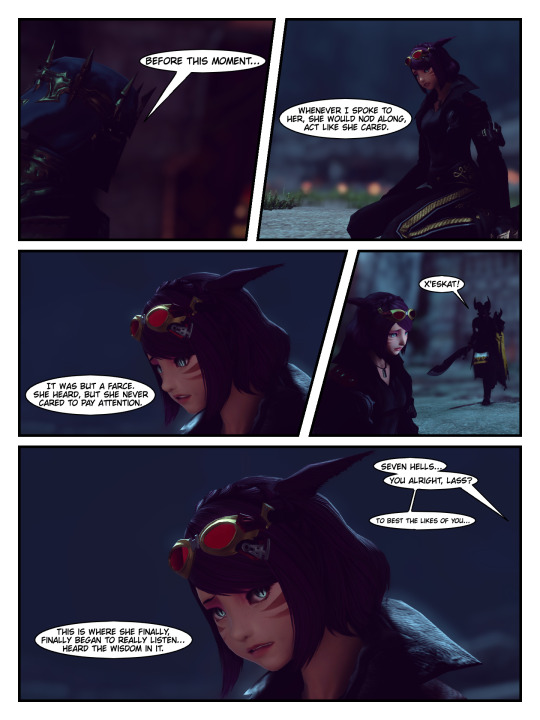
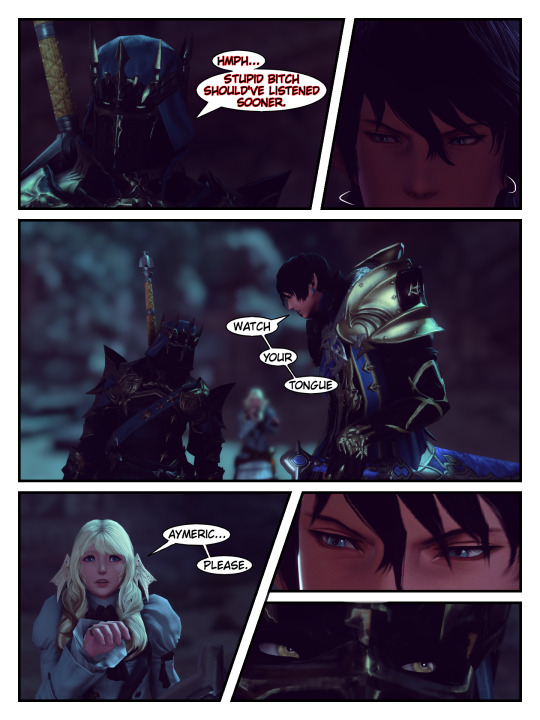

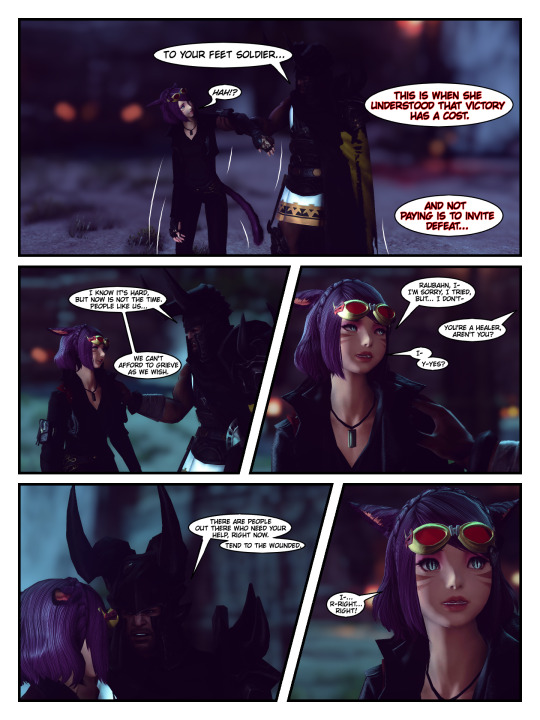
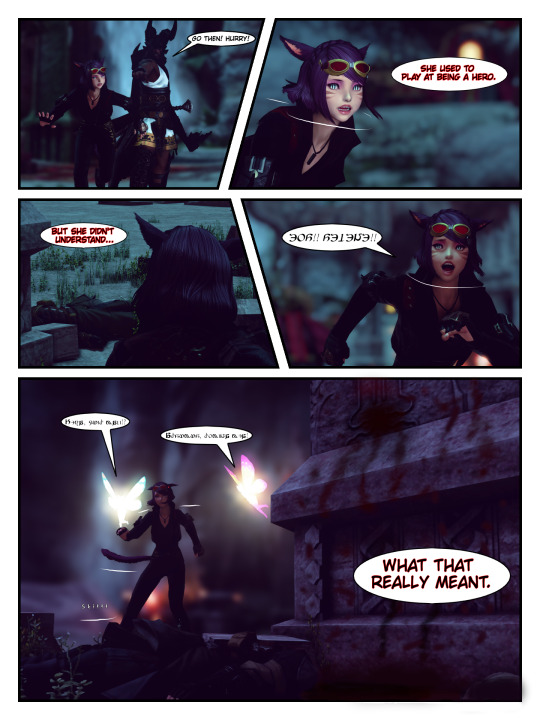
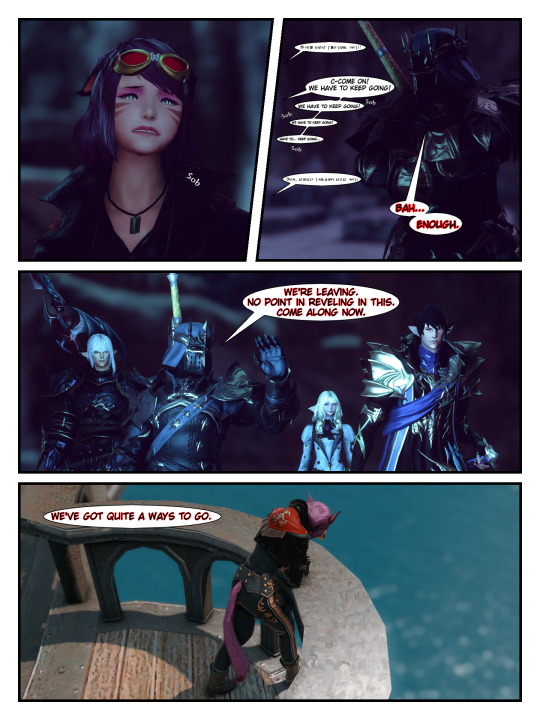

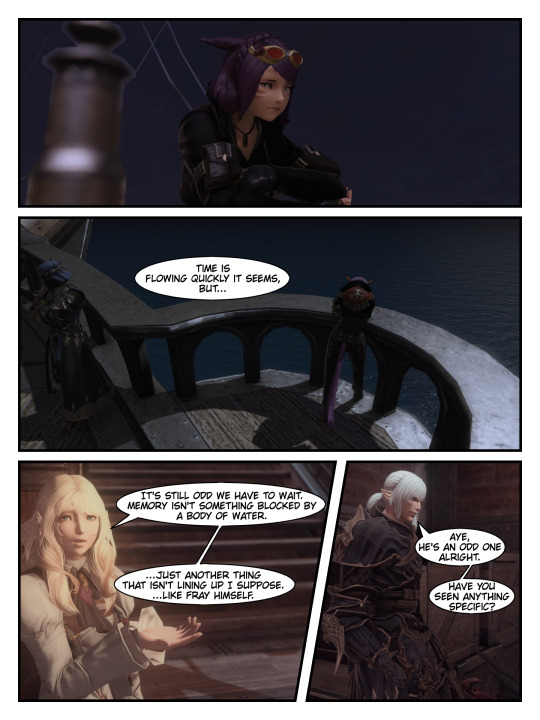
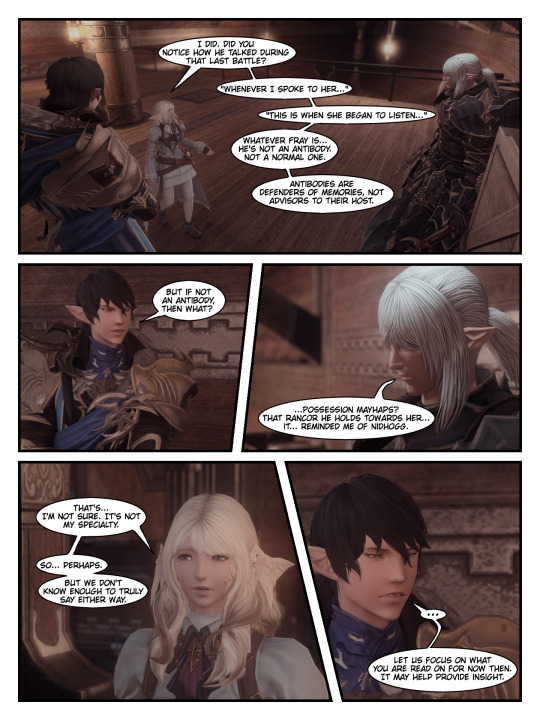
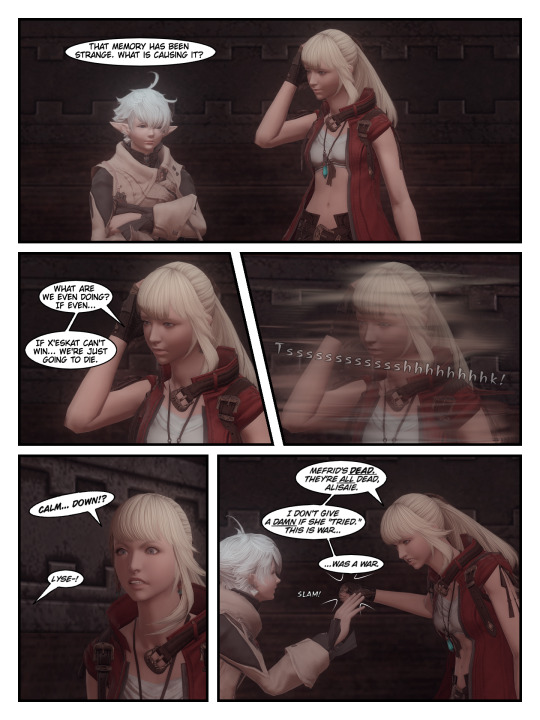
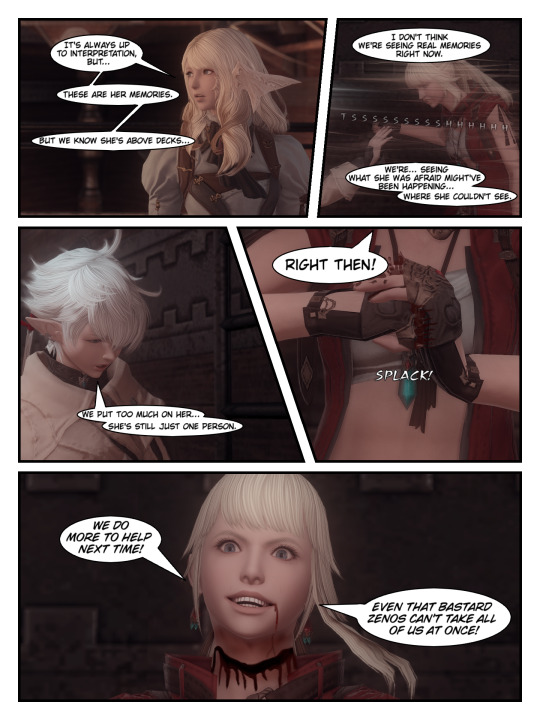
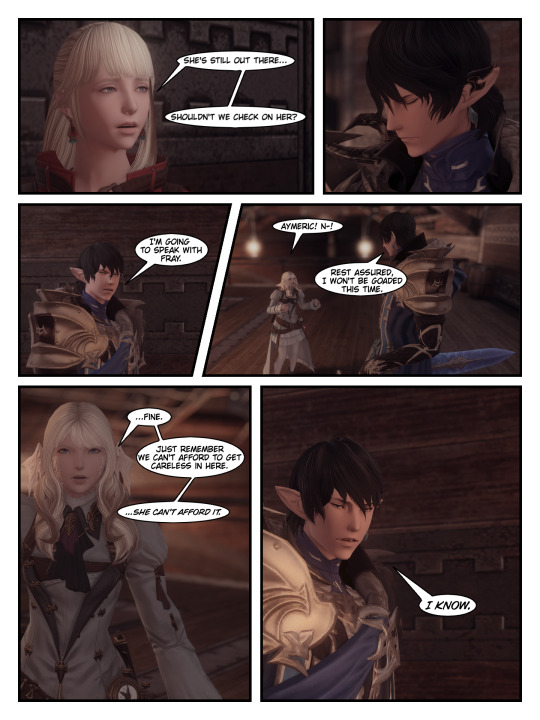
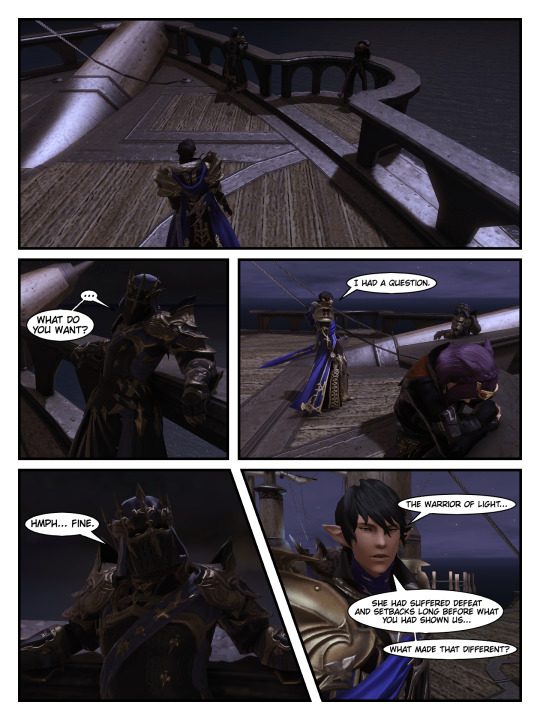
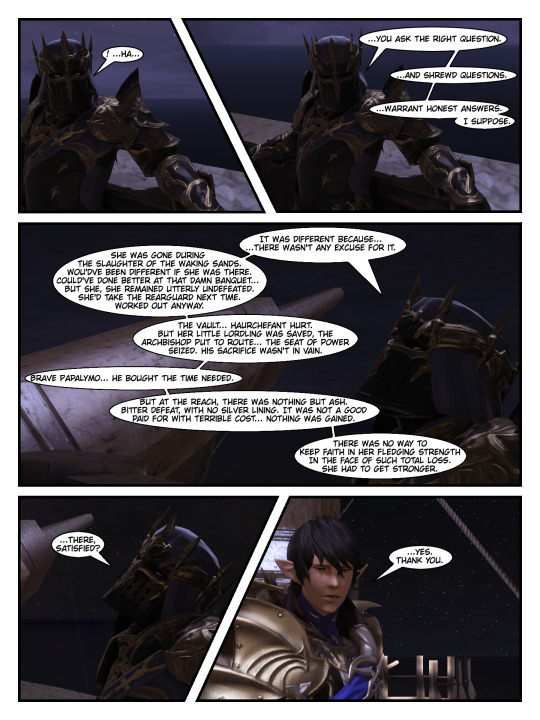
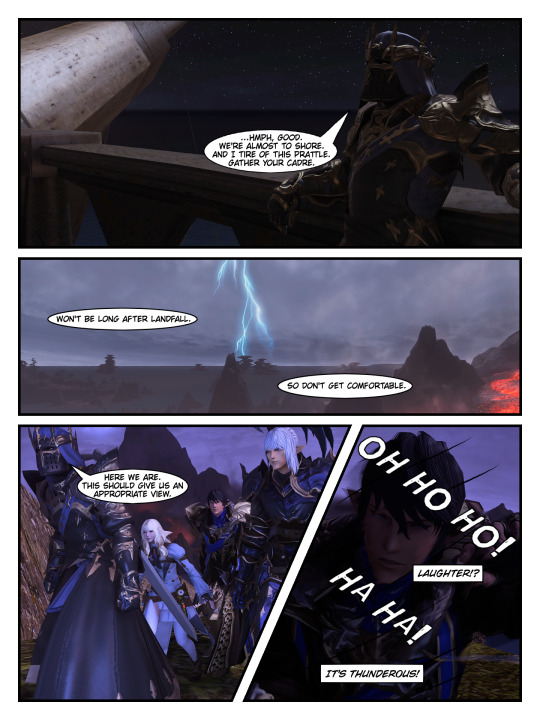
Chapter 1
Chapter 2
Chapter 3
Chapter 4 Part 1
Chapter 4 Part 2
Chapter 5
Chapter 6 Part 1
Chapter 6 Part 2
Chapter 7 Part 1
Chapter 7 Part 2
Chapter 7 Part 3
Chapter 8 Part 1
Chapter 8 Part 2
Chapter 9 Part 1
Chapter 9 Part 2
Chapter 9 Part 3
---
Transcript of the magic casts per request! I apologize to anyone who actually knows how to use the source languages beyond my paltry Google Translating.
Page 5 Panel 4: EOS! SELENE!
Page 5 Panel 5, Eos: Hera, quid mali!?
Translation: Mistress, what's wrong!?
Page 5 Panel 5, Selene: Adsumus, domina mea!
Translation: We are here, my lady!
Page 6 Panel 2, Eos: Hera quid factum est!?
Translation: Mistress what happened!?
Page 6 Panel 2 Selene: Eos, nunc tempus non est!
Translation: Eos, now is not the time!
#gpose comic#gposers#ffxiv gpose#gpose#ffxiv screenshots#final fantasy xiv#final fantasy 14#ff14#aymeric de borel#aymeric x wol#ser aymeric#look at her go#She gets to have some angst#As a treat#ffxiv scars
1 note
·
View note
Text

REMÉDIO PARA OS TEMPOS FINAIS
REVELADOS À MARIE-JULIE JAHENNY (1850-1941)
As Grandes Tribulações dos Tempos Apocalípticos
A seguir citamos alguns remédios naturais e sobrenaturais a serem usados contra as calamidades que estão ameaçando o mundo, como foi revelado à Marie-Julie por Nosso Senhor e a Virgem Abençoada. As calamidades se iniciarão pela REVOLUÇÃO.
1. - TRÊS DIAS DE ESCURIDÃO (27 de maio de 1880)
APENAS AS VELAS BENTAS se acenderão. Uma só vela será suficiente para cada lar durante os três dias de escuridão. Elas não iluminarão os lares de impiedosos e blasfemos.
2. - PRAGAS FATAIS
O único remédio para se proteger: engolir um pedaço de papel muito fino sobre o qual será escrito: Ó JESUS, CONQUISTADOR DA MORTE, SALVE-NOS. O Crux Ave.
3. - PARA ANIMAIS
Deve-se colocar em volta dos seus pescoços, a medalha de S. Benedito. ( Nossa Senhora adverte a todas as pessoas a usarem a medalha de S. Benedito - Nossa Senhora das Rosas, Maria Auxiliadora das Mães).
4. - DURANTE O PERÍODO DAS GRANDES CALAMIDADES: Terremotos, guerras, inundações, etc.
Recitar a seguinte oração à Santa Cruz: Eu vos louvo, eu vos adoro, eu vos abraço, Ó Cruz adorável do Meu Salvador, protegei-nos, guardai-nos, salvai-nos. Jesus vos amou tanto, pelo Seu exemplo, eu vos amo. Pela Vossa santa imagem, acalmai meus temores para que eu sinta apenas paz e confiança.
5. - GRANDES TEMPESTADES
A oração revelada por Nosso Senhor, deve ser recitada: Ó Crux Ave, spes única “Et Verbum caro factum est”. Ó Jesus, Conquistador da morte, salva-nos.
6. - GUERRAS E REVOLUÇÕES
Nosso Senhor revelou durante um êxtase: - “Para dispersar todo o medo e terror, você tocará a sua fronte com um retrato santo ou uma medalha da Maria Imaculada. Seu espírito permanecerá calmo. Seu coração não temerá a aproximação do terror dos homens. Seu espírito não experimentará os efeitos da Minha Grande Justiça”.
7. - DOENÇAS DESCONHECIDAS (dado durante um êxtase)
“Uma medalha do Meu Divino Coração, uma medalha sobre o qual está traçada a Cruz adorável. Você a mergulhará num copo de água as duas imagens - feita de papelão ou metal. Você beberá esta água que é duas vezes abençoada e duas vezes purificada. Uma gota apenas na sua comida, uma pequena gota, será suficiente para afastar não um flagelo, mas os flagelos da Minha Justiça.” (A Medalha Milagrosa só, preenche as condições requeridas). Você dará uma gota desta água às pobres almas tocadas por flagelo de doenças desconhecidas - aquelas que atacam o coração, o espírito, a palavra.
8. - DIVERSOS MALES
Você usará por meio de infusão (lixiviação, fervura)
A erva de S. João (Glechoma hederacea) (hera trepadeira), especialmente nas condições críticas e para dores do peito e violentas dores de cabeça;
Espinheiro alvar (Craetagus oxyacantha), para uso em cólera (que será freqüente e se espalhará) [veja abaixo o método preciso para ser aplicado, indicado conforme Santa Virgem];
Para febres desconhecidas: a humilde VIOLETA (Viola odorata), será eficiente para perfume e virtude da humildade.
9. - EPIDEMIAS E EPIZOÓTICOS (14 de maio de 1880)
O Senhor confere ao grande S. Benedito o poder de aliviar a grande calamidade. Uma procissão respeitosa da estátua, feita sem qualquer medo ou temor, poderá impedir esta calamidade.
10. - FOGO TERRENO E CELESTIAL (23 de fevereiro de 1938)
O Sagrado Coração de Jesus: O calor será terrível...um sinal da Cruz feito com água benta diminuirá o calor e afastará as faíscas. Você beijará cinco vezes as pequenas cruzes indulgenciadas... pequenas cruzes aplicadas às Cinco Chagas de Jesus Crucificado sobre a Santa Imagem. Pois tal proteção pode beneficiar almas, pobres pecadores, invocando a Minha Mãe Imaculada, Mãe da Salvação, Refúgio e Reconciliação dos pecadores.
11. - OBJETOS DE PROTEÇÃO
A Santa Virgem: “Sempre tenham prontos e ao alcance das mãos, seus objetos de proteção: suas velas bentas, suas medalhas, seus retratos e objetos santos, dos quais emanam todas as bênçãos.”
A Santa Virgem diz: - “Meus filhinhos, é a fé, é a confiança, a mais bela oração que obtém o máximo.”
2 notes
·
View notes
Note
1. I’m feel bad for you that you have come across such a man who behaves so disrespectful and causes ick. you are too amazing for that :( men sucks
2. about Odessa and Drew. I remember something either at the end of spring or in the summer, when there was some kind of hater attack on the two of them with fake accounts, it seems that it was then that Odessa tried to answer the haters (I’m not sure because I saw post-factum discussions and if someone correct me those who know and observed the situation, it would be good) and this caused a big wave of hate. sort of??? maybe after that these two decided to stop defending themselves from any hate and ignore it and in general closed themselves from fans in social media ?

1. baby you’re beyond good to me. the fact you view me in this way makes me want to smile and cry at the same time
2. that’s my exact reasoning. it’s sisyphus* going up the hill and unless you’re stuck in an ancient greek tragedy forced by the gods to do it, i’d bail too. i think we have to do what’s necessary to look after ourselves. i wouldn’t be surprised if they have deemed that necessary
*i originally said atlas but that’s the wrong metaphor
3 notes
·
View notes
Note
To be fair I feel it's unfair coz what made Muscular the way he is? And how is a simple convo that would go the same with Shiggy enough to convince? Rappa is a good guy coz hes a chaotic neutral trope but he couldn't care less about Eri being tortured but coz he just is a meathead who is implied to have fought with parents and run off to be a fighter he's a good guy suddenly. Also we know Overhaul's tragedy but he's a nobody? And why forget Moonfish, Mustard and the other "good"er Yakuzas?
On one hand, I always felt the manga will go this way. Deku is a better hero than All Might, that's established from the start. A number of themes were raised to show society's flaws like abuse, poverty, and prejudices that pushed people into villainy. It could be guessed that one of the way Deku's time would be different from All Might's is that the approach to fixing society would be more structural and not symbolic. Villain rehabilitation is hinted at here and there. They are not all evil and some of them just ended up in bad circumstances
On the second hand, Hori doesn't go all in with delivering this message. 1) Maybe because the manga is so overfilled with characters and themes or 2) maybe he doesn't want to make stances that would end up too political. Criminal rehabilitation is an actual real-life thing, writing it openly and clearly as a good thing is making a statement. It's a bit softer to talk about "saving" the bad guys and making villains way too sympathetic. 3) It also feels like a lack of knowledge on how exactly such things work. Like he never encountered an absolutely tragic person, who suffered greatly because of their stupid harmful actions and yet refused any help. It's naïve to expect you can save anyone and he tries to put it with Muscular's case but then. The line between who can be saved and who can't is unclear. It's blurry. Why is one character treated this way and another pretty the same differently? This hypocrisy is fine in storytelling (they are just not important as a character) but bad if you want to drive a message across... And 4) showing something as a better solution will require you to criticize the previous solutions. That Horikoshi doesn't do at all. He wants to keep All Might as a symbol of perfection while showcasing all the dirt under the rug. His solution was purely cosmetic, why not say it out loud? It didn't fix anything, it just made people safe for as long as one (1) man is alive and well. The worst security system I have ever seen. In conclusion, Horikoshi doesn't go all out, doesn't apply the "rules" to everyone, and ends up inconsistent, like he doesn't understand how certain thing works, making it all sound unbelievable
On the third hand, is shounen action manga with plenty of violence a place to say violence is bad at all? There are a lot of "rules of the genre" and heroes fighting villains is a classic one, yet Horikoshi ends up making a statement against violence or killing villains. But then they have to kill AFO without any questions. He points out that the thing™ is bad but our heroes were doing the thing™ from the very start and they don't end up overthinking their ways. He questions the rules of the genre without subverting them. It's a one-time thing that doesn't change anything globally so we end up with big major points that lead to anything. It feels like a conflict between what Horikoshi tries to say and what kind of story he writes (probably tied to previous point)
On the fourth hand, I was in a twitter argument about this ones and I really enjoy winning it post factum
Muscular is bad because he is bad, born this way perhaps but Toga is bad (born this way) and we pity her. Muscular is bad because he enjoys suffering but then so does Dabi and he is given more sympathy than ever. They deserve saving because they are the main characters is what I am thinking and Muscular is there to be shown a lesson. I wish it was one of the main cast who could be used for it, that would drive the point better but that would mean having a good nuanced position on something and making a statement and being smart
I would say Rappa is in the gray area, not really a good guy but he plays this role in Vigilantes. Curious. I wished that Shie Hassaikai would join the heroes at the end to showcase the growth perhaps but ugh eh why do this
I need to wrap this whole thing up. I think Hori wanted to write a smart manga with criticism of society but ended up writing some Naruto-style mess where so many things are happening that nothing really matters. You give up trying to find a point but then there are so many hints here and there that fandom arrives at the opposite ideas and fights all day long. LoV are revolutionaries let's go
#asks#bnha#bnha manga spoilers#Please don't treat this as a meta I can express my points better and I am still in pajamas
2 notes
·
View notes
Text
anyway to study i types up a bunch of Latin vocab
Enjoy this bullshit (undercut)
Ch. 1
Nouns
casa, casae, f. – house, cottage
cēna, cēnae, f. – dinner
fēmina, fēminae, f. – woman
puella, puellae, f. – girl
Verbs
ambulō, ambulāre, ambulāvī, ambulātum – to walk
cenō, cenāre, cenāvī, cenātum – to dine
festīnō, festīnāre, festīnāvī, festīnātum – to hurry
intrō, intrāre, intrāvī, intrātum – to enter
labōrō, labōrāre, labōrāvī, labōrātum – to work
Adjectives
fessus, fessa, fessum – tired
laetus, laeta, laetum – happy
parātus, parāta, parātum – prepared, ready
Adverbs
Mox – soon
Nōn – not
Conjunctions
Et – and
Sed – but
Ch. 2
Verbs
iuvō, iuvāre, iuvāvī, iuvātum – to help
Laudō, laudāre, laudāvī, laudātum – to praise
Nārrō, nārrāre, nārrāvī, nārrātum – to tell
Parō, parāre, parāvī, parātum – to prepare
Salūtō, salūtāre, salūtāvī, salūtātum – to greet
Vocō, vocāre, vocāvī, vocātum – to call
Nouns
Aqua, aquae, f. – water
Fābula, fābulae, f. – story
Fīlia, fīliae, f. – daughter
Via, viae, f. – road, way
Adjective
Īrātus, īrāta, īrātum – angry
Adverb
Subitō – suddenly
Preposition
In – (+abl.) in, on; (+acc.) into, towards
Chapter 3
Verbs
Maneō, manēre, mansī, mansum – to remain
Sedeō, sedēre, sedī, sessum – to sit
Videō, vidēre, vīdī, vīsum – to see
Ascendō, ascendere, ascendī, ascensum – to climb
Cadō, cadere, cecidī, cāsum – to fall
Currō, currere, cucurrī, cursum – to run
Dūcō, dūcere, dūxī, ductum – to lead
Inquit – he/she/it says
Mittō, mittere, mīsī, missum – to send
Redeō, redīre, redīvī, reditum – to return
Audiō, audīre, audīvī, audītum – to listen to, hear
Nouns
Terra, terrae, f. – land, earth
Cibus, cibī, m. – food
Colōnus, colōnī, m. – farmer
Fīlius, fīliī, m. – son
Ager, agrī, m. – field
Puer, puerī, m. – boy
Adjective
Ānxius, ānxia, ānxium – anxious
Pronoun
eum/eam– him/her (acc.)
Preposition
Ad – (+acc.) to, towards
Conjunction
Nam – for
Chapter 4
Verbs
Adest – he/she is present
Cūrō, cūrāre, cūrāvī, cūrātum – to care for, look after
Accēdō, accēdere, accēssī, accēssum – to approach
Prōcēdō, prōcēdere, prōcessī, prōcessum – to go forward
Surgō, surgere, surrēxī, surrēctum – to rise
Dormiō, dormīre dormīvī, dormītum – to sleep
Veniō, venīre, vēnī, ventum – to come
Adjectives
Magnus, magna, magnum – great, big
Miser, misera, miserum – miserable
Multus, multa, multum – much, many
Adverbs
Cūr – why?
Diū – for a long time
Iam – now, already
Lentē – slowly
Saepe – often
Tandem – at last
Nouns
Amīcus, amīcī, m. – friend
Lūdus, lūdī, m. – school
Pronouns
eōs/eās – them (acc. pl.)
Ille, illa – he, she
Conjunctions
Quod – because
Ubi – when
Chapter 5 (Don’t forget the last word on the next page)
Verbs
clāmō, clamāre, clamāvī, clamātum – to shout
dō, dare, dedī, datum – to give
rogō, rogāre, rogāvī, rogātum – to ask
spectō, spectāre, spectāvī, spectātum – to watch
iaceō, iacēre, iacuī, iacitum – to lie down
respondeō, respondēre, respondī, respōnsum – to answer
dīcō, dīcere, dīxī, dictum – to say
emō, emere, ēmī, ēmptum – to buy
pōnō, pōnere, posuī, positum – to place, put
trādō, trādere, trādidī, trāditum – to hand over
adveniō, advenīre, advēnī, adventum – to arrive
facio, facere, fēcī, factum – to make, do
Noun
hortus, hortī, m. – garden
Adjectives
ūnus, ūna, ūnum – one
duo, duae, duo – two
trēs, tria – three
alius, alia, aliud – other, another
bonus, bona, bonum – good
malus, mala, malum – bad
Adverb
statim – immediately, at once
Pronoun
quid? – what?
Prepositions (put the case on the back of the card with the definition)
cum – (+abl.) with
in – (+abl.) in, on
per – (+acc.) through, throughout
Conjunction
nec/neque – and not, nor
Chapter 6 (Conjunctions continue on the next page)
Verbs
dēbeō, dēbēre, dēbuī, dēbitum – ought, must; to owe
doceō, docēre, docuī, doctum – to teach
iubeō, iubēre, iussī, iussum – to order someone (+acc.) to do something (+inf.)
cōnstituō, cōnstituere, cōnstituī, cōnstitūtum – to decide
dīmitto, dīmittere, dīmīsī, dīmissum – to send away
lūdō, lūdere, lusī, lūsum – to play
scrībō, scrībere, scrīpsī, scrīptum – to write
cupiō, cupere, cupīvī, cupitum – to want, desire
eō, īre, īvī (or iī), itum – to go
exeō, exīre, exīvī (or exiī), exitum – to go out, leave
Adjectives
cēterī, cēterae, cētera – the others, the rest
meus, mea, meum – my
tuus, tua, tuum – your
Nouns
iānua, iānuae, f. – door
littera, litterae, f. – letter
domus, domī, m. – home (domum – [acc.] (to) home)
magister, magistrī, m. – teacher
Pronouns
ego – I; mē – (acc.) me
tū – you; tē – (acc.) you
Adverbs
celeriter – quickly, swiftly
dīligenter – carefully, hard
iterum – again
Preposition
prope – near (+acc.)
Conjunctions
itaque – and so
nec/neque…nec/neque… – neither… nor…
Chapter 7
Verbs
convocō, convocāre, convocāvī, convōcātum – to call together
navigō, navigāre, navigāvī, navigātum – to sail
oppugnō, oppugnāre, oppugnāvī, oppugnātum – to attack
pugnō, pugnāre, pugnāvī, pugnātum – to fight
dēfendō, dēfendere, dēfendī, dēfensum – to defend
occīdō, occīdere, occīdī, occīsum – to kill
resistō, resistere, restitī – to resist
vincō, vincere, vīcī, victum – to conquer
capiō, capere, cēpī, captum – to take, seize
fugiō, fugere, fūgī, fugitum – to flee
iaciō, iacere, iēcī, iactum – to throw
Adjectives
cārus, cāra, cārum – dear
fortis, forte – brave, strong
omnis, omne – all, every
Nouns
īra, īrae, f. – anger
pugna, pugnae, f. – fight
***canis, canis, f./m. (c.) – dog
comes, comitis, f./m. (c.) – comrade
*(c.) common means that any person, regardless of gender, can be a “comrade”*
frāter, frātris, m. – brother
***nāvis, nāvis, f. – ship
pater, patris, m. – father
prīnceps, prīncipis, m. – prince
rēx, rēgis, m. – king
***urbs, urbis, f. – city
Adverbs
fortiter – bravely
Preposition
ā/ab – from, by (+ abl.)
Chapter 8
Verbs
possum, posse, potuī – to be able, can
exspectō, exspectāre, exspectāvī, exspectātum – to wait for
servō, servāre, servāvī, servātum – to save
timeō, timēre, timuī – to fear
reddō, reddere, reddidī, redditum – to give back, return
relinquō, relinquere, relīquī, relictum – to leave behind
vertō, vertere, vertī, versum – to turn
coniciō, conicere, coniēcī, coniectum – to hurl
Prepositions
circum – around (+acc.)
ē/ex – out of, from (+abl.)
Nouns
hasta, hastae, f. – spear
porta, portae, f. – gate
mūrus, mūrī, m. – wall
māter, mātris, f. – mother
***mors, mortis, f. – death
Adjectives
mortuus, mortuua, mortuum – dead
sōlus, sōla, sōlum – alone
territus, territa, territum – terrified
incolumis, incolume – safe, unharmed
Adverbs
bene – well
hīc – here
hūc – (to) here, hither
Conjuctions
-que – and
Chapter 9 (other than verbs, the vocab list in the textbook is complete)
Verbs
gaudeō, gaudēre, gāvīsus sum – to rejoice
habeō, habēre, habuī, habitum – to have
moneō, monēre, monuī, monitum – to warn, advise
taceō, tacēre, tacuī, tacitum – to be silent
bibō, bibere, bibī, bibitum – to drink
cōnscendō, cōnscendere, cōnscendī, cōnscēnsum – to board (a ship)
conveniō, convenīre, convēnī, conventum – to come together, meet
accipiō, accipere, accēpī, acceptum – to receive
Nouns
īnsula, īnsulae, f. – island
equus, equī, m. – horse
vir, virī, m. – man
labor, labōris, m. – work, hardship, suffering
***nox, noctis, f. – night
uxor, uxoris, f. – wife
Adjectives
novus, nova, novum – new
parvus, parva, parvum – small
paucī, paucae, pauca – few
tacitus, tacita, tacitum – silent
tōtus, tōta, tōtum – whole
ingens, ingentis – huge
Adverbs
sīc – thus
Preposition
inter – among, between (+acc.)
Chapter 10
Verbs
habitō, habitāre, habitāvī, habitātum – to live, dwell
ōrō, ōrāre, ōrāvī, ōrātum – to pray, beg
quaerō, quaerere, quaesīvī, quaesītum – to ask, seek
quiēscō, quiēscere, quiēvī, quiētum – to rest
tollō, tollere, sustulī, sublātum – to life, raise
Adjective
prīmus, prīma, prīmum – first
Adverbs
prīmum – first
vix – scarcely
Nouns
nauta, nautae, m. – sailor
silva, silvae, f. – wood, forest
unda, undae, f. – wave
caelum, caelī, n. – sky, heaven
perīculum, perīculī, n. – danger
saxum, saxī, n. – rock
verbum, verbī, n. – word
clāmor, clāmōris, m. – shout
homō, hominis, c. – man, human being
lītus, lītoris, n. – shore
***mare, maris, n. – sea
mōns, montis, m. – mountain
Prepositions
dē – down from, about (+ abl.)
sub – under (+ abl.)
Chapter 11
Verbs
aedificō, aedificāre, aedificāvī, aedificātum – to build
errō, errāre, errāvī, errātum – to wander, err, be wrong, make a mistake
imperō, imperāre, imperāvī, imperātum – to order (+ dat.)
stō, stāre, stetī, statum – to stand
cognoscō, cognoscere, cognōvī, cognitum – to get to know, learn
occurrō, occurrere, occurrī, occursum – to meet (+ dat.)
ostendō, ostendere, ostensī, ostentum – to show
succurrō, succurrere, succurrī, succursum – to help (+ dat.)
inveniō, invenīre, invēnī, inventum – to find
ferō, ferre, tūlī, lātum – to carry, bear
Adjectives
nōtus, nōta, nōtum – known
ignōtus, ignōta, ignōtum – unknown
Nouns
fāma, famae, f. – fame, report, reputation
patria, patriae, f. – fatherland
rēgīna, rēgīnae, f. – queen
somnus, somnī, m. – sleep
ventus, ventī, m. – wind
bellum, bellī, n. – war
cōnsilium, cōnsiliī, n. – plan
templum, templī, n. – temple
vīnum, vīnī, n. – wine
arma, armōrum, n. pl. – arms, weapons
castra, castrōrum, n. pl. – camp
***collis, collis, m. – hill
***hostis, hostis, c. – enemy
nōmen, nōminis, n. – name (nōmine – by name, called)
Adverb
semper – always
Conjunction
dum – while
1 note
·
View note
Link
#bankfraud#bankloanpayoff#banks#CancelYourMortgage#CAPSecurity#capsecurity#debtloanpayoff#debttermination#nomortgagepayments
0 notes
Text
"Boundary Breach: The University's Intrusion into Collegiate Affairs"
University of Calicut v. K P Ameen Rashid & another
Writ Appeal 50/2024
High Court of Kerala at Ernakulam

Heard By Hon’ble Mr Justice A Muhamed Mustaque J & Hon’ble Madam Justice Mrs Shoba Annamma Eapen J
Order pronounced on 14.02.2024 dismissing the Writ Appeal of the Calicut University. The Bench observed that the role of the University in Private Colleges is limited to the extent of ensuring that University regulations are followed or not. The University cannot assume the role of the Principal and direct the College Principal to act on their direction. There is no merit in this writ appeal. The writ appeal fails, and it is accordingly, dismissed.
This is a case that began from a complaint by a Research Scholar, C H Amal, in the Department of Physical Education from Calicut University against a student, KP Ameen Rashid, of BA (Economics) from the SEEDAC College of Arts in Palakkad District & affiliated with Calicut University enrolled for the Academic Session 2022-2025
The complainant questioned the election of Rashid as a Senate Member while being a regular student of SEEDAC College & his working as a Project Assistant with Thachanattukara Grama Panchayat.
The University enquired with the Panchayat with regards to the engagement of Ameen. Panchayat confirmed that Ameen was engaged from 9/12/2021 till 12/4/2023 as a Project Assistant.
The Vice-Chancellor heard the complainant C H Amal and student Ameen Rashid. Based on the hearing, the Vice Chancellor on 25.07.2023 directed the Principal of SEEDAC College to remove Ameen Rashid from the rolls as he had not attended class on a single day in the first semester and cancel his admission and report the same to the University.
Abiding by the instructions of the Vice Chancellor the Principal of SEEDAC College cancelled the admission of Ameen on 14.08.2023.
Ameen Rashid challenged his cancellation of admission through Writ Petition before the High Court of Kerala at Ernakulam and submitted that the University of Calicut granted affiliation to SEEDAC College in Economics quite late and to compensate for the academic loss, the College was directed to provide extra classes as well as online classes. He has attended all the online classes along with other students and his attendance is there on record of the College. And with regards to his working as a Project Assistant, it is on a daily wage basis on Holidays and he is doing work at night.
The Single Judge of the High Court set aside the order of the Principal of cancellation of Admission of Ameen Rashid & observed that out of the 9 students enrolled for the regular classes, none attended the regular classes why Ameen Rashid is singled out which is legally unsustainable.
Aggrieved by the order of the Single Judge, Calicut University went in Appeal before the High Court.
Observation of the High Court in Writ Appeal
1. The role of the University providing affiliation to the college is confined only to the supervisory nature, and the authority to determine the factum of absence from classes lies with the Principal of the College.
2. The Principal has no case that Ameen Rashid did not attend the classes. The Principal cannot surrender his freedom to take action against a student, to the University.
3. If conducting classes online is not permissible, the University will have to take action against the College and not against the student who attended the classes online. If the College had conducted classes online and allowed the students to attend classes online, we do not understand why the University is showing undue interest in this matter.
4. The complaint was concerning the first semester and the University itself had allowed Ameen to write the first semester examination. The University subsequently can’t raise any complaint while allowing Ameen to write the first-semester Examination.
5. The University in a proceeding challenging the selection of the student in an election matter, cannot collaterally decide a question on non-attendance and decide against the student. At best, the University could only have ordered the Principal to provide a report regarding the actual attendance of the student to the University.
6. The Principal of the College in its counter filed in Writ Petition had certified that Rashid had sufficient attendance and he had attended all the online classes.
7. The University on its own jumped from the student being elected as senate member to the inquiry regarding the attendance of the student. Attendance of the student is a regular day-to-day administrative matter falling within the domain of Principal of the SEEDAC College. It is difficult to understand why the University was taking undue interest in the matter of Ameen Rashid. When none of the 9 students enrolled for BA Economics didn’t attend the regular class and all attended the online class. The University needs to be concerned about the standards of education but not in a way of chasing a wild goose.
Seema Bhatnagar
#CALICUT UNIVERSITY#SEEDAC COLLEGE OF ARTS#ATTENDANCE#ELECTION AS SENATE MEMBER#COMPLAINT#WRIT APPEAL#CANCELLATION OF ADMISSION#SCOPE OF UNIVERSITY IN COLLEGE AFFAIRS
0 notes
Text




By chance I happened upon pictures of two nearly identical Jacqueline Humphries paintings, listed a few entries apart from one another on the "recent acquisitions" page of the LA MOCA website. It took me a moment to realize that one of the paintings was a mirror-image reproduction of the other. This reminded me of Robert Rauschenberg's similarly odd decision to make two copies of the same "combine," a type of painting/collage/sculpture hybrid he created in the 1950s. I'm not sure how Humphries executed her duplicate, which is made of a different type of paint than the original and is the tiniest bit off-scale (assuming Untitled #5 is the original and Untitled #5A is the duplicate).
Jacqueline Humphries (American b. 1960). Untitled #5 1995. Oil on linen, 90 x 90 inches. Museum of Contemporary Art, Los Angeles.
#5A 1995. Acrylic lacquer on canvas, 89 1/2 x 88 inches. Museum of Contemporary Art, Los Angeles.
Robert Rauschenberg (American b. 1925). Factum I 1957. Oil, ink, graphite, crayon, paper, fabric, newsprint, printed reproductions, and printed paper on canvas; 61 1/4 x 35 7/8 inches. Museum of Contemporary Art, Los Angeles. Source.
Factum II 1957. Oil, ink, graphite, crayon, paper, fabric, newsprint, printed reproductions, and printed paper on canvas; 61 3/8 x 35 3/4 inches. Museum of Modern art, New York. Source.
0 notes
Text
💐💐💐💐💐💐💐💐💐
EVANGELHO
Terça Feira 31 de Outubro de 2023
℣. O Senhor esteja convosco.
℟. Ele está no meio de nós.
℣. Proclamação do Evangelho de Jesus Cristo ✠ segundo Lucas
℟. Glória a vós, Senhor.
Naquele tempo, 18Jesus dizia: “A que é semelhante o Reino de Deus, e com que poderei compará-lo? 19Ele é como a semente de mostarda, que um homem pega e atira no seu jardim. A semente cresce, torna-se uma grande árvore, e as aves do céu fazem ninhos nos seus ramos”. 20Jesus disse ainda: “Com que poderei ainda comparar o Reino de Deus? 21Ele é como o fermento que uma mulher pega e mistura com três porções de farinha, até que tudo fique fermentado”.
- Palavra da Salvação.
💐💐💐💐💐💐💐💐💐
- Comentário do Dia
💎 A força oculta da Palavra de Deus
A graça divina opera na vida da Igreja e na de todos os fiéis como uma semente que desabrocha e o fermento que faz crescer a massa. É preciso saber esperar e deixar essa força oculta de Deus transformar-nos dia após dia.
1. O grão de mostarda (v. 19). — O Reino de Deus é semelhante à “semente de mostarda, que um homem pega e atira no seu jardim”. Esta semente, embora seja a menor de todas, “cresce e torna-se uma grande árvore” (lt. ‘factum est in arborem’). Trata-se, é claro, de uma hipérbole ou, quem sabe, de uma expressão popular e corriqueira nos tempos de Cristo. Este “exagero” expressivo do qual Jesus aqui lança mão alude claramente ao vaticínio de Ezequiel, em que um ramo de cedro é arrebatado por Deus e plantado no cimo do monte Sião. Ali, ele “estenderá seus galhos e dará fruto; tornar-se-á um cedro magnífico, onde aninharão aves de toda espécie, instaladas à sombra de sua ramagem” (Ez 17, 22).
Assim também o grão de mostarda, espargido neste mundo pelo Filho de Deus, ainda que pareça a menor e mais insignificante das sementes, vai crescendo dia após dia, a ponto de tornar-se, para espanto de muitos, uma árvore frondosa e verdejante, sob cujos ramos as aves do céu vêm fazer o seu abrigo. Esta semelhança entre o grão de mostarda e a Igreja se vê: a) por sua origem discreta e quase desprezível, pois a humildade é a “marca registrada” das obras de Deus, que escolhe o que é vil, estulto e fraco aos olhos do mundo para confundir os sábios e fortes da terra (cf. 1Cor 1, 27-31); b) por seu crescimento admirável, porque assim como de um pequenino grão brota uma planta vistosa, do mesmo modo a Igreja, minúscula nos seus primórdios, cresce à base da seiva vivificante da graça e da Palavra de Deus, infundidas pelo Espírito Santo nos corações dos seus ramos; c) por seu desenvolvimento orgânico, pois assim como a planta não é mais do que a semente já madura, assim também a Igreja que hoje vemos é a mesma que Nosso Senhor instituiu há dois mil anos sobre o fundamento dos Apóstolos.
2. O fermento na massa (v. 21). — O Reino de Deus é ainda “como o fermento que uma mulher pega e mistura com três porções de farinha, até que tudo fique fermentado”. Esta profunda e brevíssima parábola não só reitera o sentido da anterior, mas significa também o quão grande é a força oculta do Evangelho para transformar pouco a pouco, à semelhança da levedura, as convicções e os sentimentos mais íntimos da humanidade, a ponto de converter o mundo inteiro, morto pelo pecado e insípido pela falta de amor, numa massa saborosa, em um Corpo único em que estejam reunidos, como em uma só família, todos os que Cristo conquistou por seu Sangue. Esta virtude oculta da graça, por fim, não deixará de atuar “até que tudo fique fermentado”, ou seja, até que se cumpra plenamente em nós aquela vocação à perfeição na caridade a que fomos chamados. Por isso, podemos ver nesta parábola certa alusão à SS. Eucaristia, o fermento novo da pureza e da verdade que nos purifica do fermento velho da malícia e da corrupção (cf. 1Cor 5, 7-8), penetrando-nos com a vida do próprio Cristo e assemelhando-nos cada vez mais, por sua contínua ação santificadora, à natureza do próprio Deus.
Deus abençoe você!
💐💐💐💐💐💐💐💐💐

0 notes
Text
Eugenicisation. Origin of term and usage.
Eugenicisation. Origin of term and usage.
__________________________________
In this short video a search through the net: Fred Zacaria has come up with the term "Eugenicisation" from his own mind (despite being seldom used in rare occasions here and there, in the past few years), he foretells the probability that it might become of widespread use.
According to Google-terms search it has rarely been used privately by singular individuals in their communication or some writings but by all means not widespread,
There are only 2 google pages, no trace in wiktionary, nor : audio, video, vocabularies/dictionaries such a s britannica etc., no wikipedia, no trace in gov platforms such as genome.gov
Besides there is definitely no chance I would have stumbled into the term before this period, it was totally obsucre even if it has been roaming in few minds, mostly using it as "the killing of love" (see catholicism website)... the term was extracted by fred zacaria through syllogism and deep empirical over-30-years observation/thought in societal paradigms. Probably the term was captured by him from the 'ether', see the 100th monkey theory.
There is a chance that from this date on (13/8/2022) a google search might result with far many more results in the far future or even near future , that is the reason why this video has been done, for remembrance.
Thank you for watching and reading, please subscribe, like and share,
also support the ministry in prayer.
God bless you,
Fred Zacaria - Rome 2022
(John 1:14)Et Verbum Caro Factum Est
www.fredzacaria.webnode.it
Tidbit.
The sound of wind every 10 seconds is the fan, I'm in Rome, midday august and its hot weather.
I was lazy to put the videocamera on a stable ground, i just engaged one arm with the stand-videocamera and the other with mouse, quick and easy! but not professional (sorry).
_____________________________ _____________________________
-"Truth Is Stranger Than Fiction!" (Mark Twain)
-"Imagination Is More Important Than Knowledge!" (Albert Einstein)
-”Fantasy storytelling is a perfect alibi for partially revealing crypto truths” (Fred Zacaria)
______________________
Disclaimer:
This work is classified as dystopian fiction in the fields of science, politics, religion; it uses metafors and allegorical novellas. Any similarity to circumstances or actual persons living or dead is purely coincidental.
***********************
The above audio episode could be one of a series, because the topic is detailed, deep and complicated, and the techniques/strategies are sophisticated and stealthy, in my decades daily experience with the public I have seen and learned many things, empirically.
___________________
Etimology and neo-nomenclature coinage:
english : eugenics - eugenicist ---> eugenicisation(by fz)
italian : eugenetica - eugenetista ---> eugenizzazione(by fz)
In this episode here are some questions, and relative considerations:
what is eugenics?
-did Plato say something about it?
-what did the ancient romans do to the "unfit" babies?
what happened in 1883, and between 1915/1945?
what happened after wwII?
is eugenics now used only towards animals, plants,
and micro-organisms (gain of function)?
and many more.
Enjoy! Please like, share, comment, sms me or email.
Dont forget to support the ministry, ask for my Paypal.
God bless you, Fred Zacaria , August 2022.
.-.-.-.-.-.-.-.-..-.-.-.-.-.-.-.-..-.-.-.-.-.-.-.-.
Who is Fred Zacaria?
Fred Zacaria born in 1959, studied at the University of Rome (1303 ad), is the founder since 2001 of "Acap, Associazione Cristiana Aiuto Pratico", a charitable mission helping the needy with free: food, clothing, courses, and mainly now domestic jobs, tens of thousands of families and persons found jobs through the mission. Various Acap prayer groups were formed in asian countries, combining pratical help with spiritual councelling.
He also ran 4 prayer halls in Rome open to the public all year round from 2001 till 2017, they were prayer and Bible preaching with daily practical help, the activity is momentarily online (smart working) and we pray to open soon another prayer hall if we find sponsors. Between 2005 and 2017 many groups were formed in Asia (7 in the Philippines, 1 in Thailand, 1 in Nepal). Street meetings and house prayer groups were/are formed in Rome from 2017 to present, compatibly with sanitary rules and regulations.
He was a public orator speaking in italian churches and travelling Italy from north to south in the nineties, he stopped travelling due to founding Acap in 2001 and getting very busy with his own mission.
He read the equivalent of hundreds of books on many different subjects in 3 languages. Visited many countries in: europe, middle east, gulf area, has been twice in the USA (NY, DC, Atlanta Georgia, Orando Florida).
His father was egyptian, became a British national during the second half of his life, his mother was italian from Turin, so Fred Zacaria is [egyptian-italian].
*Since 2015 he's the founder of a christian mystic-gnostic ideology [ based on ancient egyptian cryptico-mysteric knowledge ], the "zacarian christian gnosticism", a neologism already discussed in some cultural circuits. He is generally addressed as "father" or "pastor" which is neither! Prefers to be addressed as "brother" or simply "zacaria".
Fred Zacaria was born roman catholic (for 30 years) then became an evangelical (for another 30 years!), his expertise since 1975 is connecting world (social, political, economic) events in relation to "Revelation 13"!
*He encourages all forms of dissent but exclusively within the democratic framework of 'law & order' respecting common rules of whatever society God has placed us in, and only through means of peaceful NON violent actions, including the way we communicate (speak or write) with each other.
*His work (writing, podcast, videos) is mainly in the field of "narrative fiction" (fantasy stories) : science, politics and religion, he systematically speaks and writes in: English, Italian, Arabic.
--->>>This is a fantasy channel.
*For further information visit his website www.fredzacaria.webnode.it
*Questions?-------> Tel. +39.3807770333 Rome, Italy.
*Podcasts and videos, search the net: fred zacaria + SPREAKER.
*Booking for events : +39.3273674858 (please allow 90 days)... or email.
*Email: [email protected]
*Donations : www.paypal.me/fredzacaria
God Bless You! (John 1:14)
"the value of a person is measured in accordance with how
he treats people who can't do anything for him!" (Fred Zacaria 2001)
The above audio speech was extracted from:
https://www.spreaker.com/user/fredzacaria/society-eugenenicization1
p.s.
Fred Zacaria is self taught (autodidact)
... just like (***) :
Tagore , nobel prize
Charles Dickens
Jack London , the father of science fiction,
mark twain,
George Bernard Shaw, Nobel Prize
Ernest Hemingway, Nobel Prize
Ray Bradbury,
Ron Hubbard
Van Gogh
Malcolm X,
George Orwell
Frank Zappa
Orson Welles,
Stanley Kubrick
Dario Argento
Steven Spielberg,
David Bowie,
Bruce Springsteen
Leonardo da Vinci
James Watt
Thomas Alva Edison
Nikola Tesla,
The Wright Brothers
Henry Ford,
Blaise Pascal,
Galileo Galilei,
Michael Faraday,
Benjamin Franklin,
Leibniz
Karl Marx,
Alan Watts,
Julian Assange
Abraham Lincoln,
Steve Jobs
Bill Gates Harvard dropout
Marck Zuckerberg Harvard dropout
Elon Musk Stanford dropout, only 2days!
(***) Source : https://en.wikipedia.org/wiki/List_of_autodidacts
...so don't be discouraged for not having a degree!
just never stop reading ...and thinking. Fred Zacaria.
____________________________
-extra tags :
eugenizzazione della società
____________________________
August 12, 2022pm, just discovered "eugenicisation" is actually on the net, I thought I was the one coining it! Obviously we are all "entangled" just like the 100th monkey theory: I thought I was the "coiner" (from scratch) but in actuality it was already in the "ether" and I simply captured/snatched it unknowingly, its ok.
1 note
·
View note
Text
2021.09.06
Complete fics posted on AO3 this day
1. Factum Fieri Infectum Non Potest by @supernaturalgrant [M, 26k]
►“You’ve been paying your dues since you were eighteen, Draco, don’t you think it’s time to stop?” // Or - Draco goes into a downward spiral following the death of Astoria. His friends, all of them, do their best to pull him out of it.
2. Flying On Faith by @isamijoo [G, 3k]
►The science spaceship Scorpius has an important weapon that can help the Federation win The War. Harry and his crew are tasked to protect this ship. But first, Harry wants to see the cargo.
3. Tell Me Love Is Endless by @alxmeg & @rewriteparagraph [M, 33k]
►In an unfair world like this, sometimes people fall in love with their soulmates after they are dead. Just like Draco Malfoy does.
---
Fest/Exchange
1. The Plans We Made by Anonymous [G, 5k]
►After the war, it got easier for Harry to leave a few things behind and start to live with less. Luckily for Draco, Harry had already carved a place for him in his heart.
★ H/D Summer Vibes 2021 | @gwbexchange
2. Wormwood & Realgar by Anonymous [T, 24k]
►In which Harry has a dragon to find, a heart to return, and two mountains to climb.
★ Quidditch Fest 2021 | @quidditchfest
54 notes
·
View notes
Text

ENG:
1457 , November 23, Sigishoara.
Mihail Silagi certifies the end of the conflict between the Voivode Vlad Dragula and Brasov, and asks the Brasovians to preserve and not disturb the established peace.
RU:
1457 , 23 ноября , Сигишоара.
Михаил Силаги удостоверяет прекращение конфликта между воеводой Владом Драгулей Цепешем и Брашовым, и просит брашовян мир налаженных хранить и не нарушать.
_____
The letter:
"Nos Michael Zylagy de Horogzeg, banus Machouiensis et capitaneus Nandoralbensis notum facimus tenore praesentium significantes quibus expedit universis, quod cum nos cum serenissimo principe et domino domino Ladislao dei gratia regni Hungariae et cetera rege domino nostro gratioso super quibusdam differentiis inter maiestatem suam et nos exortis per medium venerabilis viri domini Alberti praepositi Agriensis vicecancellarii regii ad treugas pacis, quae paci perpetuae praeambula esse consueverunt, a praesenti festo sanetae Clementis papae1) usque ad festum purificationis sanetae Mariae virginis2) devenissemus. Volumus ut huiusmodi treugae non solum a nobis et nostris sed etiam ab omnibus nobis adhaerentibus firmiter observentur. Et ob hoc factum differentiarum quae exortae fuerunt inter illustrem bominum Wlad vaivodam Transalpinum, fratrem nostrum, ad una ac inter prubentes viros iudicem et iuratos ceterosque cives et inhabitatores civitatis Brassouiensis et terrae Barcza ab alia partibus intercepimus ipsasque partes per medium nuntiorum suorum utputa Stoyka, Stan et Dan ipsius Wlad vaivodae et venerabilem Johannem, plebanum de Brassouia ita concordavimus, quod huiusmodi nuntii et oratores utriusque partis ad manus iuraverunt, quod infra tempus praedictarum treugarum et ultra quousque aliud a maiestate regia ipsi cives Brassouienses non habuerint in commissis semper quiete et pacifice vivent sibique ipsis mutuo nulla dampna nullaque impedimenta inferrent nec inferri faciant. Quod quia dicta civitas Brassouiensis et inhabitatores terrae Barcza quendam Dan, qui se pro vaivoda Transalpino gerit in eorum medio non tenebunt neque fovebunt, sed de eorum medio relegabunt et compellent. Nos itaque pro praefato Wlad fratre nostro dictis civitati Brassouiensi et terrae Barcza ac inhabitatoribus eorundem promisimus et promittimus praesentium literarum testimonio, quod Wlad vaivoda pacem et treugas huiusmodi observabit et faciet observari. Si vero in aliquo per se vel suos contrarium contingeret nos id reformare tenebimini et reformabimus. Si vero ex parte praefatorum civium et inhabitatorum terrae Barcza conventio fieret ipsi cives modo simili id emendare et reformare teneantur. Et post reditum dictorum nuntiorum suorum sigillo dictae civitatis secreto literas praesentium videlicet reversales pro praefato Wlad vaivodae conficere et emanare facere teneantur. In < > huius altamsecus fiendis cuius videlicet partis culpa res turbari contingeret. Sciendum erit semper conscire praefati domini Johannis plebani cuius conscientiam in hoc parte constituimus onerari harum nostrarum vigore et testimonio literarum mediante. Datum in Segeswar in festo beati Clementis papae, anno domini Mo CCCCo LVIIo".
1) November 13.
2) Februar 2.
6 notes
·
View notes
Text
So in the endnotes of “Verbum caro factum est” I mentioned that I would save my headcanons about Nicky and the Franciscans for another time and then a bunch of people in the comments were like “I Would Like To See It” which, fair, so here we are.
First of all, shout out to these tags from @regina-del-cielo which really made me start thinking about this seriously:

The Franciscans (which includes the Order of Friars Minor, who are men, and the Poor Clares, who are women) are a Christian religious order that was founded in 1209 by Saint Francis of Assisi (the Poor Clares were founded in 1212 by Saint Clare of Assisi, who saw what Francis was doing and was like, what’s up can the ladies also get in on that).
I shan’t give you a full rundown of my man Francis’s life because he had quite a full one but here are some reasons I think Nicky would have vibed with him, even if they never actually met:
1. First and foremost, the Franciscans take material poverty and service to the poor very seriously. St. Francis was definitely a “put your money where your mouth is” kind of guy, except he was a mendiant friar so he had no money, but the point still stands. Nicky “we can do some good” di Genova 🤝 Francis “I once heard the voice of God telling me to repair his church and so I literally repaired a church building and then started a monastic order” of Assisi.
2. Francis spent a lot of his early life re-evaluating some poor life choices. He lived a rather riotous life as a young man, his father was very rich, and he went away to war with dreams of grandeur only to be captured and held prisoner for a year, which caused him to reconsider his conduct.
3. Francis had a dramatic streak I think Nicky would have been amused by. Francis’s father didn’t approve of this whole “I’m going to devote my life to God and become as poor as Christ” thing, and he and Francis had a very public confrontation in which Francis’s father said “fine, go do these foolish things, but you have to return everything I have ever given you” and Francis said “gladly” and stripped naked on the spot, because his clothes had come from his father.
4. Just in terms of chronology, the start of Nicky’s life and the start of the Franciscans are close to each other, less than 150 years apart. I think he and Francis would both have been trying to answer the question “how can I best serve God and my neighbor” and I think Nicky would have been interested in Francis’s answers.
#tune in next time for my talk about Nicky and the Jesuits#they literally called themselves the footsoldiers of the Lord#there’s a lot going on there#feel like I should also mention that Francis was part of the Fifth Crusade#he tried to convert the sultan in Egypt#did not work. he should not have gone as no one should have gone on crusade.#but here we are#Christian history is complex and often deeply awful#and still full of people striving#but the Crusades are always a case of ‘and we do condemn it! wholeheartedly!’#just want to make that clear
78 notes
·
View notes
Text
Vegeta’s Character Analysis Looooooooooong Read
Oh my, what can I say? I just really love to write long essays in a language that isn’t even native to me, lol.
Well, nobody’s perfect, I guess. ... Were you expecting a Cell joke here? I may not be perfect, but that doesn't mean I have to be that predictable.
Ahem, anyway.
This isn't exactly a psychological analysis of the character - more like, hmm, a storytelling analysis. Or something in between, really.
You may not find anything fundamentally new in this text, but I definitely had fun writing it, haha.
It's mostly amateur. I have a useless psychology degree, but not a literature one.
My classic rant about vegebul fics is included, of course.
Summary: proper psychological analysis requires a single continuous personality, which Vegeta simply doesn’t have.

The more I think about Vegeta, the more I come to the conclusion that he is only pretending to be a consistently evolving character.
In fact, he's a bit like 10 different characters in one, which abruptly replace each other (and that's without considering the difference caused by the voice actors’ approach and the changes in his looks). Essentially, Vegeta's a collection of disparate images, arbitrarily lined up by Toriyama and hastily glued together. And the beginning of this line is so far from the end of it that these two extreme images cannot be perceived as belonging to the same person. Well, because human psychology just doesn't work that way.
(Not that Vegeta is unique in this respect – it’s a common feature of characters in long stories that authors compose as they write. Still, his case is quite extreme and interesting as example.)
I mean, take Vegeta in the Saiyan or the Namek arc. He's a complete psychopath. He clearly doesn’t suffer at heart from the unnecessary violence (as, for example, Guts from Berserk). His behavior looks like something natural for him, not an unhealthy defensive reaction. He enjoys it, he smiles happily, killing and torturing weak innocent people. And such a degree of psychopathy is not something that can be healed by a couple of deep personality crises or years of peaceful family life. Vegeta's redemption arc works through strong emotional impact and forgetfulness of the audience, but makes very little sense when viewed in retrospect.
~~~~~~~~~~~~~~
Perhaps the biggest, hmm, splitting of the personality occurred with Vegeta right after the Namek arc. Toriyama had already made a small retcon of the character’s motives before (to include Vegeta in the context of the Freeza army after the Saiyan arc), but it didn't feel that drastic.
You see, until Vegeta was invited to Bulma’s house…..
(Gosh, Toriyama, you could’ve done it more subtly, really. Vegeta killed Yamcha, threatened to kill Bulma, gutted Zarbon in front of her eyes, slaughtered an entire Namekian village... Oh well.)
…Ahem, anyway, right up to Bulma's invitation, Vegeta looked to me like a character who, hmm, has a life of his own? I mean, you have always felt that his motives and behavior were generated by the bizarre social system, not related to the little world of Goku and his friends. Simply put, Vegeta was a natural product of the big space civilization, an organic part of it. His whole personality was formed by it, all his plans, motivation and ambitions were associated with it. And although in the Saiyan arc, he gave the impression of an independent entrepreneurial chief at the head of a small hierarchy, in the Namek arc it was revealed that Vegeta is actually far from independent. He lost his throne and his people, he was in slavery to the tyrant all his life, and wants to take power for himself. So, his social background and the motives caused by it post factum get much more complex. But in short, Vegeta wanted a highest possible position in the hierarchy he knew. In this way, he was… social? His belonging to the Saiyan race was only a small (although important) part of the overall picture. Because the Saiyans were dead, but the Freeza Empire was alive.
But when Toriyama realized Vegeta's popularity and decided to keep him in the story after Namek, it came as a blow to the character's personality. Apparently, the author simply couldn't come up with an elegant way that could keep the character in all its complexity around, and therefore did a very clumsy thing. He roughly cut Vegeta out of his social context and almost forcibly glued him to the main character group like a poorly done appliqué. But although you see rough edges and glue drips, the story moves on rapidly, distracting you with Freeza and Future Trunks, and you don't stop to think about what happened. This is how, almost imperceptibly, Toriyama changed Vegeta's motives (and, consequently, the basis of his personality). Yes, Vegeta's saiyan pride was also significant part of his character previously, but when it became his sole and central motivation after Namek, you feel like a very big and important piece of him has been arbitrarily cut off. This wouldn't have happened if Toriyama had followed the logic of previously established social motives, rather than his desire to make Vegeta a convenient figure. Now, bound hand and foot by the author, the character is forced to behave as the plot requires.
Still, all this can be justified by the fact that Vegeta experienced a deep emotional shock as a result of death, which forced him to rethink his life priorities and wait for Goku (especially in the manga, where he just lived with Bulma for a whole year after Namek, without even trying to use dragonballs) ... And then he waited for the androids (despite the final death of Freeza and his father, which was an excellent chance to try to take over the decapitated empire). Anyway, this rationalization doesn't negate the fact that the character, as a result, has lost a significant part of the fire that he demonstrated in the Namek arc. His new energy, the energy of obsession with surpassing Goku, turns him into a new character – bitter, marginalized and focused on training.
(Ironically, the very splitting that made him a less attractive character in my eyes allowed vegebul to take place. After all, imagining the romantic relationship of the nice Bulma and Vegeta at the height of his villainous ambition is really difficult. That just would be a psychologically implausible story.)
In the Android and Cell arcs, after brief glimpses of the SSJ superiority, Toriyama turned Vegeta into a plot tool, whose personality flaws he could use to spoil the situation favorable for the heroes. As a result, Vegeta continued to be an angry and unhappy character who has lost most of his charisma, but on top of that, he also started to be really annoying. ... Still, also kinda amusing thanks to his truly impressive inability to draw obvious conclusions from the ego bruises he gets.
(If you ask me, the character's biggest contribution to the Cell arc was to ignore the existence of condoms, lol. Although strictly speaking even it was an achievement of Future Vegeta (RIP). But seriously, Vegeta's relationship with Trunks turned out to be one of the few things that I was really interested in about this part of the story.)
And then there was Goku’s death and the 7-year-gap. ... At the end of which Vegeta still didn't look like a happy man who has found his place in the world. Even though he had seven whole years (and a spaceship) to change something. I mean, this is the case when it'd be logical to expect changes in the character, but for some reason they didn't really happen (or they did, but veeery quietly and unstable). I mean, Vegeta trains with Trunks, yes. And he's married to Bulma now, apparently (which we learn only at the end of the arc though). And he hasn’t killed himself yet, which means that he sees some meaning in his existence. Hurray, I guess?.. The problem is that when we first see Vegeta after the timeskip, he keeps walking around with such a sullen expression, as if Goku had died just yesterday. (Remember Vegeta in the Saiyan arc? He smiled quite often. For the wrong reasons, but hey.) Basically, Toriyama tried to sit on two chairs at the same time here - 1) keep Vegeta as recognizable as possible (because he hasn't decided what to do with him yet) and 2) keep him around (which doesn't make sense for the character if he hasn't undergone significant changes during the timeskip). And the result of this hesitant approach is an undesirable effect - it feels as if Vegeta hasn't built a new life for himself all these years, but only waited for Goku to return.
As if the man is unable to evolve without Goku's influence. Until Kakarot does or says something, or is just around, everyone else in Vegeta's life and his own reflection has little or no meaning. Old social ambitions? His wife and child? New insights gained from life on Earth? Pffft. Goku is able to destroy the seven years’ worth progress (no matter how small it may seem) in one day, and at the same time, one fight with him is enough for Vegeta's character development to jump forward explosively. It sounds like a solid ground for shipping, but In fact it’s just a direct consequence of the author's poorly chosen narrative structure.
The thing is, Toriyama tend to avoid romance and slices of life, and shows Vegeta's personality mainly through fights and their consequences. And at the time Goku just turned out to be the only significant character for Vegeta, the fight against whom could be used as an excuse to develop the character in front of the audience. Well, Toriyama couldn't get Vegeta to fight Bulma or himself, you know.
I believe that the plot structure chosen by the author (rapidly changing action events immediately after a long timeskip) is not a very good basis for a redemption arc. For a good redemption, a character had to have screen time during which small changes accumulate gradually, between the big points. And Vegeta simply didn't have it. Besides, the scheme by which Vegeta develops is really messy. Because at first, Toriyama kinda froze his development at the neutral point (thereby partially devaluing the influence of Vegeta's family on him). Then in one moment, the author abruptly reversed even this the-end-of-the-Cell-arc development with Majin Vegeta (this time completely devaluing the family factor, because the betrayal was Vegeta’s conscious decision). God, how I hated the Majin Vegeta idea. And in the next scene, the author made a quick retcon, which gave the family’s influence the status of a ground for Vegeta’s personal growth again for no apparent reason. It's as if a huge bundle of family values was post factum squeezed into the character in defiance of everything that we just saw with our own eyes. This is a complete narrative mess.
But... oddly enough, Vegeta's redemption still manages to work, and work spectacularly. My guess is that it's because by that time the audience is already SO sick of Vegeta, frozen in his bitter anti-heroism, that it desperately wants the author to finally do something new with the miserable guy. Well, at least get him out of his misery. So people are willing to accept it in any possible form.
... And the author chose the form of a powerful emotional catharsis. The explosion was legendary, haha.
I don't even know if this is a good reason to call Toriyama a genius (after all, he found a very clever way out of a difficult situation, in which he found himself thanks to his own bad decisions.)
The only thing I'm sure of is that despite everything I was very sad because of Vegeta's death. I didn't even realize that I had become emotionally attached to this asshole until he made such a spectacular exit, lol. As if something had broken inside of me, and all the analyticity of my mind couldn’t prevent it. I was surprised when I found myself crying really hard - usually my emotions don't reach this level due to fictional stories. (Well, maybe it was due to the fact that my own father was dying of cancer at that time, and the moment just triggered my emotions. ... Oops, it seems a little too personal, doesn't it? Well, at the end of the day, this fact is an integral part of my unique dbz experience. Come to think of it, in dbz, fathers die regularly).
But while this scene greatly affects emotions and forces a new viewer (or reader) to truly reconsider their attitude towards the character for the first time, the absence of a neat gradual movement towards this moment weakens its influence somewhat.
At this point, Vegeta’s character splits once again (perhaps the last time within DBZ). You simply cease to understand who this man really is and who he was before.
~~~~~~~~~~~~~~
Now, when I look at all the images of Vegeta in general, I come to the conclusion that I like this character the most in the first two arcs and in the end of the last arc. Two directly opposite moral poles.
(Funny enough, because my initial reaction to Vegeta and Nappa was annoyance: "Well hello, the next stereotypical villains who like to chat and laugh maliciously instead of simply killing their victims." (Still, against the background of Freeza, Vegeta turned out to be a much lesser evil in every sense, haha). You see, usually I'm not a person who likes villains. Basically, I only distinguish such characters from others as a result of romance or redemption. It’s only after that I begin to see aesthetics in their villainous charisma as well.)
And now, in retrospective, I believe that at the beginning of the story Vegeta is at the maximum of his vitality and charisma. Especially compared to his ever-crisis moody version (who supposedly lives happily with a loving family). In the Saiyan arc, he's objectively the most powerful character (Freeza didn’t even exist in Toriyama's head at the time). Vegeta is domineering, playful and unpredictable, but most importantly - his self-confidence is fully justified. Oh well, it was good while it lasted. He's really in control. These are, if I may say so, quite exciting qualities in a man, haha. Even if he looks like an evil dwarf in stupid armor and bullies some weaklings. I'd even say his demeanor in the Saiyan arc (especially with the voice of early Horikawa) is suspiciously easy to translate into a sexual context (well, until he loses control and gets hysterical, lol).
The Namek arc, placing Vegeta in a broader context, somewhat spoiled his original image (after all the big words, it turned out that he was running errands for Freeza all this time), but gave him a more interesting background and a strong drive. He had ambitions and a socially significant goal, and he actively and passionately fought for them against a clearly superior enemy. In addition, his inability to defeat Freeza by brute force forced him to use his brains from time to time, and not just pull another power up out of his ass, as is now traditionally done in DragonBall. (Needless to say, I consider high intelligence to be one of the most attractive traits). All this made his position in the plot as interesting as possible. He literally sparkled with energy.
Well, we know what happened next. Brain Death, an eternal chase after Goku, and an off-screen family life on a backwater planet that Vegeta is supposedly happy with. Until he suddenly became a really beautiful character without a proper justification for this (well, at least the explosion was spectacular). Really, I like the general concept of redemption, and yet... the way Toriyama portrays it in the story just doesn't work convincingly enough for me.
~~~~~~~~~~~~~~
Another point I’d like to cover in this already too long essay ahhh I'm a monster is Vegeta’s personality in fanfiction.
Reproducing (?) Vegeta is a bit like playing with a lego set - his personality and behavior is always the result of a conscious reconstruction, which is based around a specific point on the long contradictory line. Depending on which end of the spectrum the chosen point is, the author is forced to shade facts related to the opposite end, or to give new context to Vegeta's past (or future) actions. It's always noticeable when the author extends the later, sympathetic Vegeta's image to an earlier segment of the story. Apparently, it's possible to kill the person who raised you (with an evil smile on your face) just because the situation was too stressful lol. Likewise, when the authors allow Vegeta to remain a charismatic psychopath, the story wouldn't work without ignoring some parts of the later canon.
(And, of course, there is always a "medium" type of Vegeta - Vegeta from the 3-year-gap, whose personality is almost entirely based on anime fillers. Yay, here comes the promised vegebul rant
Honestly, I'm pretty tired of this "gravity room exploded again woman grrr" type of Vegeta.
Because if you take the manga, we have no idea how Vegeta actually behaved with Bulma and her parents, what his training regimen was, and what he did in his free time besides unprotected sex. People elevate his rudeness and irrational self-torturing to the absolute because of all these filler patterns, but this is just one of the possible versions of the events and the character's behavior during this time (albeit partly canonical). But... there are also alternatives. There are smart Vegeta, curious Vegeta, civilized Vegeta. Honestly - I don't think Bulma would've married him later if there was nothing in his personality that’d make communication with him enjoyable. I mean, she's a rich modern woman, she doesn't need a husband just for convenience and Vegeta is a marginal freeloader anyway. And if we subtract good looks (which people often attribute to Vegeta) from the equation, then the idea that he has no interest in anything other than training and cannot maintain an interesting conversation becomes completely unconvincing. Toriyama clearly didn't attach much importance to the fact of their marriage, and generally avoided romantic scenes as if they were on fire (and, perhaps, did the right thing), but these two just had to be capable of adequate and mutually pleasant personal interaction in order to take this step.
In general, Toriyama's lack of attention to most aspects of the characters' lives other than fighting and training, on the one hand, can be considered a drawback of DBZ, but on the other, it creates a lot of room for fans' imagination. But not everyone uses it. Most authors generally repeat the same tropes over and over again and don't try to look at the three-year-gap from a new angle, although the canon provides all the possibilities for this. Because of this, fics in this genre often seem boring. But in fact, it's not the setting itself that is boring, but only dusty formulas in the heads of the authors.)
Ahem, so where were we?.. Oh yes.
Actually, Vegeta's inconsistency is a very handy character trait for the authors, as it minimizes the chance of accidental OOC. Indeed, it's quite difficult to make someone to behave out of character if he has many different canon versions of himself, lol. On the other hand, this leads to the fact that the character seems to... kinda disintegrate. You never see his whole face, because he simply doesn't have it. As a result, Vegeta turns into a mosaic that must be reassembled each time. And I keep staring at this crazy kaleidoscope like an idiot.
~~~~~~~~~~~~~~
Well, that's... quite a lot of contradictions in my relationship to Vegeta, haha. Still, life without contradictions would be somewhat boring, I guess.
Thanks for your attention I suppose?..... lol, as if someone really got to this point
The End.
P.S. 1: The antisocial version of Vegeta who doesn't understand stupid human rituals and hates crowds, but puts up with it for the sake of his family is my spirit animal, haha. This is just so damn relatable to my autistic personality. Maybe I'm an alien myself.
P.S. 2: Actually, my favorite dbz character is Piccolo. Yep.
11 notes
·
View notes